Symbols, visuals, and memes have recently overshadowed words and text in political communication. Nonetheless, last week’s Democratic National Convention proved that words still matter, that a 21st century rhetoric can still inspire in a digital-visual world.
Ronald Reagan was called the “great communicator” because he mastered the language of the living room with stories that relayed big ideas and evoked the communal experiences of Americans. A lineup of successful speakers at the DNC did the same, foreshadowing the party’s messaging for the next two months.
Convention speakers used language that invited Americans to remember cherished moments of being together: cheering from the bleachers on Friday night, call and response from pews on Sunday morning, watching Team USA win Olympic gold, and conversations with your best friend on girls’ night out. They reminded us of the words we use when our team wins or loses, when we thank veterans for their service, we celebrate a wedding anniversary, welcome the birth of a child, or mourn the death of a mother.
And they did it in short words and phrases Americans use every day. This was a change for Democrats. Out were abstract ideas, in were muscular verbs and concrete nouns. Out were 10-point policy speeches, in were stories of patriotism and service, sports and teamwork, family and faith.
Here are some of the big ideas presented in the language of the living room:
Freedom: The abstract idea of “democracy” became the personal concrete noun “freedom.” Americans weren’t asked to save democracy. They were called to protect and regain their freedoms that democracy promised. Those freedoms affected “matters of home and heart” as Harris put it in her acceptance speech.
Joy: Joy is a word that you feel as you say it. House Democratic Leader Hakeem Jeffries (D-N.Y.) quoted Psalm 30:5 “…there will be joy in the morning.” Kamala Harris with “her laugh and her light” was the source of that joy. Second Gentleman Doug Emhoff called her “a joyful warrior… She finds joy in pursing justice.” Bill Clinton promised she would be the “president of joy.” Joy is a magnet that draws volunteers into a collective effort, just as Harris’s two grandnieces did as they taught the crowd (and America) how to say their auntie’s name in a call and response of “comma-la.”
Hope: “Hope is making a comeback,” said Michelle Obama, echoing the winning theme of her husband’s first campaign, setting him up to lead his speech with “I’m fired up” and the crowd roaring back “and ready to go.” That 2008 rallying cry came not from him, but from a campaign worker in North Carolina—a reminder to talk like Americans if you want to inspire them.
Faith as action: “Kamala has connected me more deeply to my faith, even though it’s not the same as hers,” Second Gentleman Doug Emhoff said. More than one speaker quoted “love they neighbor as thyself” and “as you’ve done it unto the least of these, you have done it also unto me.” Senator Raphael Warnock (D-Ga.) called on America to “stand up to the moral moment” and to “heal the land,” quoting Second Chronicles. “We can heal the wounds that divide us… Let’s work together. Let’s organize together. Let’s pray together. Let’s stand together. Let’s heal the land…”
Patriotism as teamwork: Democrats leveraged the word “coach” and its powerful resonance for many Americans. Steve Kerr, just back from coaching the U.S. men’s basketball team to Olympic gold in Paris, brought a message of teamwork, patriotism, and American excellence. After a litany of what true leadership is (“shows dignity, tells the truth…”), he took us onto the winner’s platform as America’s medalists “placed their hands over their hearts and the American flag was raised.”
“Coach” Tim Walz delivered a pep talk to America as patriotism’s team. With lines like “We’ll sleep when we are dead,” he was as plain spoken as Harry Truman, who famously said “I don’t have to give them hell. I just tell the truth, and they think it is hell.”
The idea of patriotism as a life of service over self often came in comparison with the Republican nominee. Bill Clinton could have been your favorite uncle taking down a braggart: “Don’t count the lies, count the I’s.”
The words “patriot” and “patriotism” were heard every night, including from one Republican: “Voting for Kamala Harris doesn’t make you a Democrat. It makes you a patriot.” The nominee invited Americans into the courtrooms where she served with five words of positive active patriotism: “Kamala Harris, for the people.” She called “the privilege and pride of being an American…the greatest privilege on earth.”
Tough and ready: The Barbara Lee Foundation refers to “the imagination barrier” in Americans seeing a woman in the role of commander in chief. Her opponents have labeled Harris a DEI hire. Clear language and memorable metaphors addressed both. Commentators noted Harris’s words (“most lethal”) to describe America’s fighting force under her presidency. Michelle Obama flipped the script comparing Harris’s rise with her opponent. “We don’t have the affirmative action of generational wealth,” and “When we see a mountain, we aren’t expecting an escalator to take us to the top.” She turned former President Trump’s words against him: “Who is going to tell him that the job he is seeking might be one of those ‘black jobs’?”
Do something: The throughline of the convention was the story of Kamala’s mother telling her “Don’t complain about injustice, do something.” That phrase became the call to action for the convention. Kerry Washington told the crowd “We all have to be Olivia Popes,” referring to her campaign manager and fixer character in Scandal, one of America’s popular primetime soaps. Michelle Obama proved again the power of one person looking into the camera and speaking from the heart when she told America: “This is Michelle Obama with the ask…”
Against the backdrop of good speakers and big ideas, America had the shared experience of pulling for those for whom speaking is hard. We heard the struggling words of former Rep. Gabby Giffords (D-Ariz.), the jubilant words of Gus Walz, who has a learning disability, saying “That’s my dad.” And of course, there was President Joe Biden, speaking in the halting way of a former stutterer after chants of “Thank you, Joe” as he passed the torch to Kamala Harris.
Over 26 million Americans watched, in one more communal experience, as Biden passed that torch and Kamala Harris made history as she accepted the nomination and looked to the future. Only time will tell if Democrats can sustain their plain talking about big ideas and if that will be enough for a victory in November.
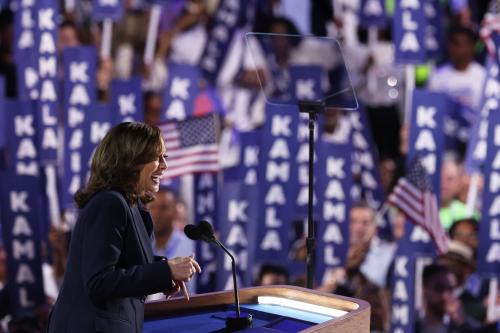
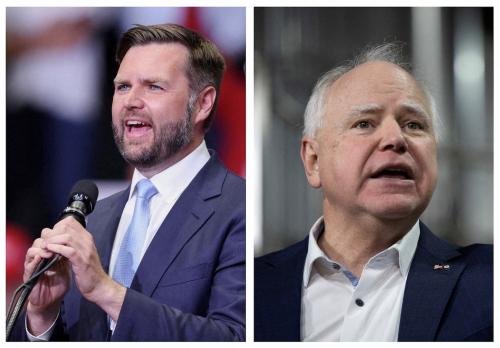
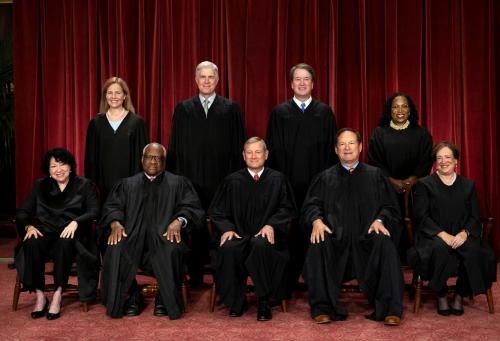
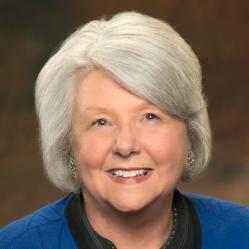

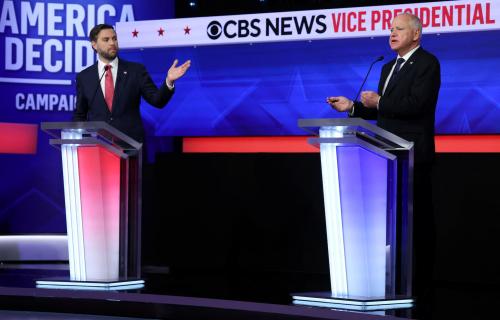

Commentary
The Democratic National Convention proved that words still matter
August 29, 2024